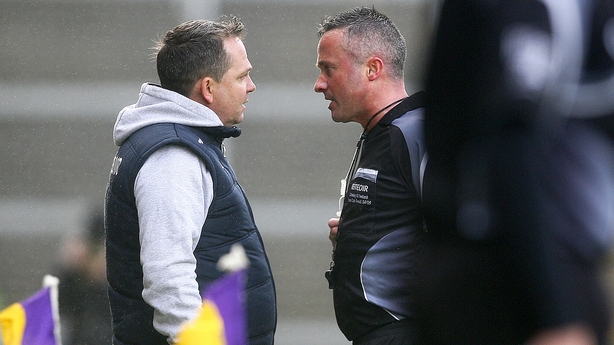Leading hurling referee James McGrath says the GAA must continue learning from other codes in order to establish a culture of respect for match officials.
The two-time All-Ireland final whistler says players and mentors at grassroots level, especially, need to take a lead from other sports to stop the production line of developing referees from drying up.
Last winter, McGrath took charge of a third-level game and says he was taken aback at how the players from one side addressed him.
"I refereed a Fitzgibbon Cup game between Trinity College and DCU and I was quite taken aback to hear the Trinity players refer to me as 'sir'. They obviously had that habit from rugby but it was completely new to me to hear something like that in a GAA match," he said.
"I think we need to get that level of respect into our game right at the start of players underage careers - and we need the parents and mentors to buy in too because I would say a lack of respect towards referees is the main reason why match officials are not coming through the system at a healthy rate like they once were.
"Westmeath were always known for producing referees and developing them but over the last three to four years we are down 20 per cent on the numbers coming through compared to what they once were.
"That's worrying, but you can't blame people for not giving it a try with the abuse that is hurled at them in some games."

McGrath is in no doubt that such abuse is the greatest factor stopping young officials from coming through the ranks. He says that unless the issue is tackled right at the source - underage level - it will continue to be a blight all the way up to the top level.
But he cites the Bank of Ireland Celtic Challenge as one competition that is making significant progress in this regard.
The Under-17 national hurling competition sees a ‘Best and Fairest' award in place of the usual Man of the Match accolade.
They are trying out new initiatives like the Best and Fairest Player award where everyone is encouraged to respect the referee. It's working well.
Referees make the call on the winners and highlight one player from each team on the basis of their skill level - and the respect they showed to the playing rules, match officials and their fellow players.
"Stuff like the 'Give respect-get respect', the silent sideline, the pre-match handshakes work, I think, but to make real progress you have to go back to the start and get the culture right from there," McGrath adds.
"That's where such tournaments are working. They are trying out new initiatives like the Best and Fairest Player award where everyone is encouraged to respect the referee. It's working well and I think it offers a template for the future."
McGrath was manager of the Westmeath Celtic Challenge side last year but after being involved with inter-county teams - as well as refereeing - for the better part of two decades he has stepped aside from managerial this season.
He feels that, aside from young players needing to show a different attitude towards referees, the officials themselves need room to breathe as they reach the pitch necessary for inter-county standard.
"Underage competitions are also massive for young referees to tread the water and gain experience at this level," he says.
"They need to gain that experience in an environment where people and players are not shouting and roaring at them. You can't underestimate what that will do for a referee's confidence levels as he or she tries to get up to the next level.
"But the whole issue is far more of a problem at club level than it is at inter-county where most people just get on with the task at hand.
"But at club level and at underage games what you have to put up with is not on. It's deterring younger referees from coming through."


